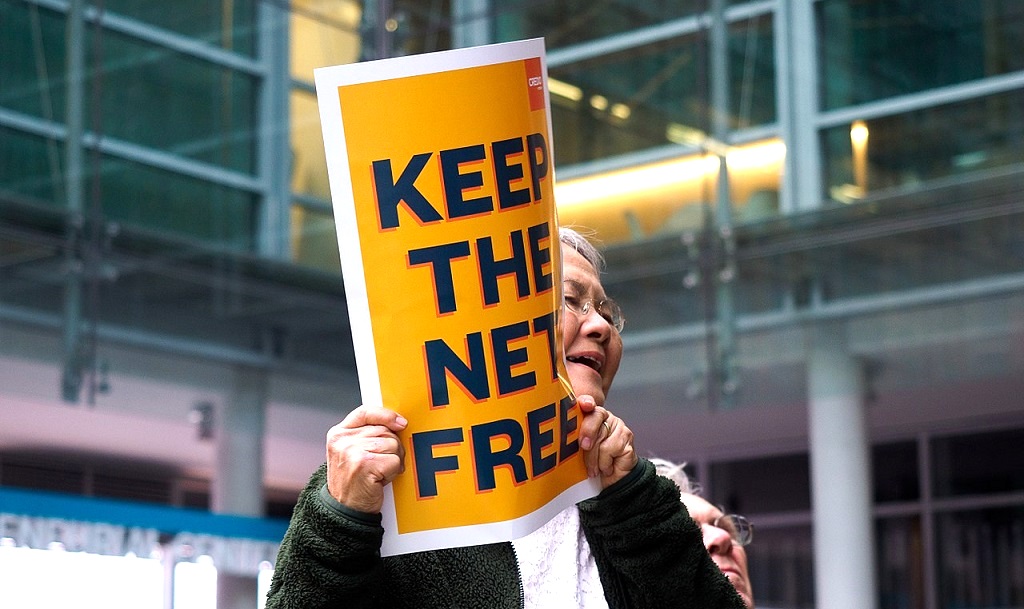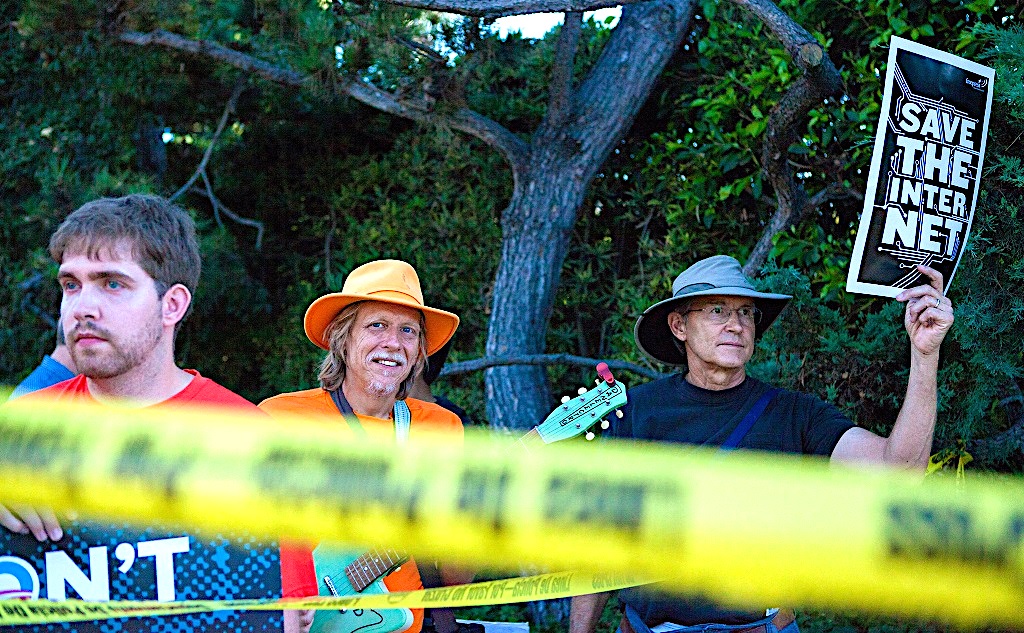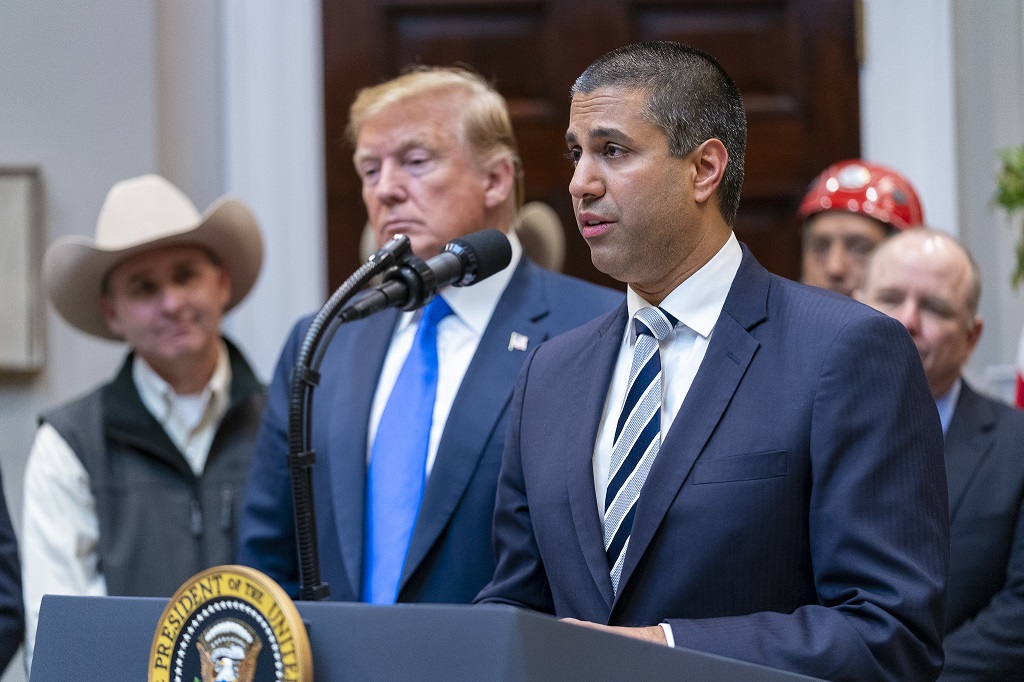The main thing about the battle for network neutrality in the USA is the chronology of events and the current state of affairs
At the end of 2017, the U.S. Federal Communications Commission (FCC) abolished the statutory requirements for net neutrality. The decision caused heated discussion in the media and even after two years of politics and IT companies do not abandon attempts to influence the FCC to reverse their decision. We talk about the formation of network neutrality and its "fall" and discuss whether he has a chance to return.

/ CC BY / Credo Action
Network neutrality is a concept according to which telecommunication companies are forbidden to differentiate traffic from different sources. For example, an Internet provider does not have the right to block access to sites and give priority to any type of content.
Net neutrality questions in the FCC Internet space were asked in the middle of the zero. At that time, large conglomerates were forming, such as AOL Time Warner and Comcast NBC Universal . These organizations possessed a large-scale computing infrastructure, controlled a significant part of the market and, if desired, could restrict user access to competitor services (for example, email or chat).
The FCC tried to exclude the latter scenario. In 2005, Commission Chairman Kevin Martin formulated four rules for telecommunications companies and Internet service providers. These rules were supposed to support healthy competition in the market.
The new principles were nothing more than recommendations and were not legislated. As expected, some providers chose to ignore them. Literally in 2005, the local provider Madison River Communications closed for its subscribers access to the Vonage VoIP service, which competed with its own application. A similar story happened in 2007 with Comcast. The operator slowed down the exchange of client files using the BitTorrent protocol on its network. This behavior caused inconvenience among company customers, and also created a “distortion” in the competitive market in favor of the network owners.
Since the recommendations that were not binding for implementation did not lead to the desired result, the FCC decided to take a different path and in 2009 adopted formal rules of network neutrality. The Commission approved the document in 2010 , but it did not manage to enter into force.
Internet providers immediately opposed the new order. Net neutrality limited their capabilities and obliged to provide the same level of services for users of all services (even competing ones). America's largest provider Verizon went to court, where it said that the FCC has no right to regulate the work of operators. A little later , another operator joined the lawsuit Verizon - MetroPCS. At that time, he was in the top 5 operators in America by the number of subscribers.
The trial went on for four years, in the end Verizon came out the winner. Although the FCC had the right to appeal the decision, for some reason, representatives of the organization decided not to continue the fight . But soon they were forced to change their mind.
Having ruled in favor of Verizon, the US court actually allowed providers to prioritize traffic and take money from companies for “premium” conditions in their networks. In turn, this could affect the cost of various services (for example, streaming platforms) that users pay for.
Major media outlets — Forbes , CNN, and Business Insider — began to report on the threat of eliminating network neutrality, and protesters gathered at FCC headquarters. IT companies like Google, Twitter, Facebook, and Netflix have joined the citizens. Many sites spent Internet Slowdown Day - loading pages of large Internet resources was deliberately slowed down to draw attention to the problem. Even President Barack Obama expressed his opinion on this issue. He advocated tightening requirements for providers.

/ CC BY-SA / Free Press
As a result, the FCC worked out an updated set of rules of network neutrality, which had a more rigorous legal justification. He forbade providers:
The rules were approved in 2015. But Internet service providers and GOP members (who were initially opposed to net neutrality) were not going to give in.
First, the providers tried to negotiate with the FCC and come to some kind of compromise. But all attempts were in vain. Then a group of telecommunications companies filed a new lawsuit . The hearings continued for several months, but network neutrality “ survived ”. This decision was called the "net neutrality final victory."
In practice, everything turned out differently. In 2016, Barack Obama's presidential term was drawing to a close, and Republican Donald Trump became the new head of state. Therefore, the chairman of the FCC was appointed a person who shares the views of the Republican Party - Ajit Pai (Ajit Pai). He had previously voted against net neutrality and remained true to his opinion. Almost immediately after taking office, he announced that the Commission was ready to review its decision on net neutrality.

/ PD / The White House
Although the community criticized the new development vector chosen by the FCC, the Commission prepared a document that repealed the 2015 rules. It turned out that network neutrality lasted only two years.
Problems with traffic discrimination began to appear almost immediately after the abolition of network neutrality. On the same day that the FCC announced its decision, Comcast began offering paid services for prioritizing traffic for sites (at least the information that such a service was not provided was missing from the company's portal). At the same time, according to tests conducted by engineers from Northeastern University, all mobile operators began to slow down the speed of Internet connections for streaming services.
The US House of Representatives has already paid attention to the problem. In April of this year, politicians approved a bill that should restore the rules of network neutrality from 2015. His further fate is in the hands of the Senate, which remains the final word. However, the bill is likely to be rejected. The leader of the Republican majority in the Senate, Mitch McConnell, has already opposed him - he called the document “unviable”.
But still there is hope that politicians will change their minds under public pressure. For example, large musicians - Tom Morello , Michael Stipe and Talib Kveli addressed the Senate with a request to return and consolidate the rules of network neutrality at the federal level. Local appeals are published, such as the Chicago Tribune .
Considering previous experience, there is reason to believe that the FCC will again change its decision if the Republican Party loses the upcoming elections, and the Democrat leader takes the place of Ajit Pai.
PS We invite you to a webinar for telecom operators, Internet providers and online services.

/ CC BY / Credo Action
First Steps to Network Neutrality
Network neutrality is a concept according to which telecommunication companies are forbidden to differentiate traffic from different sources. For example, an Internet provider does not have the right to block access to sites and give priority to any type of content.
Net neutrality questions in the FCC Internet space were asked in the middle of the zero. At that time, large conglomerates were forming, such as AOL Time Warner and Comcast NBC Universal . These organizations possessed a large-scale computing infrastructure, controlled a significant part of the market and, if desired, could restrict user access to competitor services (for example, email or chat).
The FCC tried to exclude the latter scenario. In 2005, Commission Chairman Kevin Martin formulated four rules for telecommunications companies and Internet service providers. These rules were supposed to support healthy competition in the market.
- the right to access legal content of one’s choice;
- the right to run applications freely;
- the right to freely connect devices to the network;
- the right to compete between network providers, application and service providers.
The new principles were nothing more than recommendations and were not legislated. As expected, some providers chose to ignore them. Literally in 2005, the local provider Madison River Communications closed for its subscribers access to the Vonage VoIP service, which competed with its own application. A similar story happened in 2007 with Comcast. The operator slowed down the exchange of client files using the BitTorrent protocol on its network. This behavior caused inconvenience among company customers, and also created a “distortion” in the competitive market in favor of the network owners.
Courts with telecommunication companies
Since the recommendations that were not binding for implementation did not lead to the desired result, the FCC decided to take a different path and in 2009 adopted formal rules of network neutrality. The Commission approved the document in 2010 , but it did not manage to enter into force.
Our habratopiks:
Internet providers immediately opposed the new order. Net neutrality limited their capabilities and obliged to provide the same level of services for users of all services (even competing ones). America's largest provider Verizon went to court, where it said that the FCC has no right to regulate the work of operators. A little later , another operator joined the lawsuit Verizon - MetroPCS. At that time, he was in the top 5 operators in America by the number of subscribers.
The trial went on for four years, in the end Verizon came out the winner. Although the FCC had the right to appeal the decision, for some reason, representatives of the organization decided not to continue the fight . But soon they were forced to change their mind.
Public response
Having ruled in favor of Verizon, the US court actually allowed providers to prioritize traffic and take money from companies for “premium” conditions in their networks. In turn, this could affect the cost of various services (for example, streaming platforms) that users pay for.
Major media outlets — Forbes , CNN, and Business Insider — began to report on the threat of eliminating network neutrality, and protesters gathered at FCC headquarters. IT companies like Google, Twitter, Facebook, and Netflix have joined the citizens. Many sites spent Internet Slowdown Day - loading pages of large Internet resources was deliberately slowed down to draw attention to the problem. Even President Barack Obama expressed his opinion on this issue. He advocated tightening requirements for providers.

/ CC BY-SA / Free Press
As a result, the FCC worked out an updated set of rules of network neutrality, which had a more rigorous legal justification. He forbade providers:
- block legal applications, services and devices;
- slow down the services;
- provide priority access to services on a fee basis.
The rules were approved in 2015. But Internet service providers and GOP members (who were initially opposed to net neutrality) were not going to give in.
Short life of net neutrality
First, the providers tried to negotiate with the FCC and come to some kind of compromise. But all attempts were in vain. Then a group of telecommunications companies filed a new lawsuit . The hearings continued for several months, but network neutrality “ survived ”. This decision was called the "net neutrality final victory."
In practice, everything turned out differently. In 2016, Barack Obama's presidential term was drawing to a close, and Republican Donald Trump became the new head of state. Therefore, the chairman of the FCC was appointed a person who shares the views of the Republican Party - Ajit Pai (Ajit Pai). He had previously voted against net neutrality and remained true to his opinion. Almost immediately after taking office, he announced that the Commission was ready to review its decision on net neutrality.

/ PD / The White House
Although the community criticized the new development vector chosen by the FCC, the Commission prepared a document that repealed the 2015 rules. It turned out that network neutrality lasted only two years.
How things are with net neutrality today
Problems with traffic discrimination began to appear almost immediately after the abolition of network neutrality. On the same day that the FCC announced its decision, Comcast began offering paid services for prioritizing traffic for sites (at least the information that such a service was not provided was missing from the company's portal). At the same time, according to tests conducted by engineers from Northeastern University, all mobile operators began to slow down the speed of Internet connections for streaming services.
The US House of Representatives has already paid attention to the problem. In April of this year, politicians approved a bill that should restore the rules of network neutrality from 2015. His further fate is in the hands of the Senate, which remains the final word. However, the bill is likely to be rejected. The leader of the Republican majority in the Senate, Mitch McConnell, has already opposed him - he called the document “unviable”.
But still there is hope that politicians will change their minds under public pressure. For example, large musicians - Tom Morello , Michael Stipe and Talib Kveli addressed the Senate with a request to return and consolidate the rules of network neutrality at the federal level. Local appeals are published, such as the Chicago Tribune .
Considering previous experience, there is reason to believe that the FCC will again change its decision if the Republican Party loses the upcoming elections, and the Democrat leader takes the place of Ajit Pai.
A couple of materials from the VAS Experts corporate blog:
PS We invite you to a webinar for telecom operators, Internet providers and online services.
All Articles